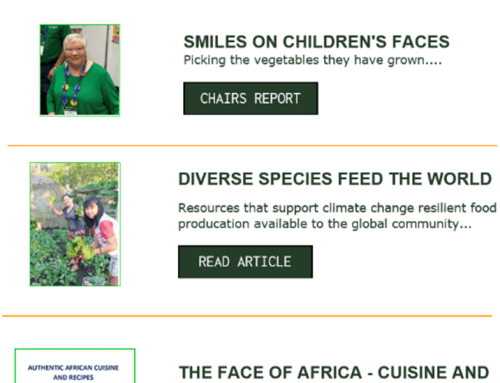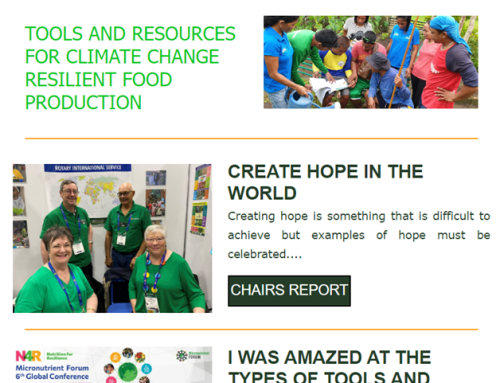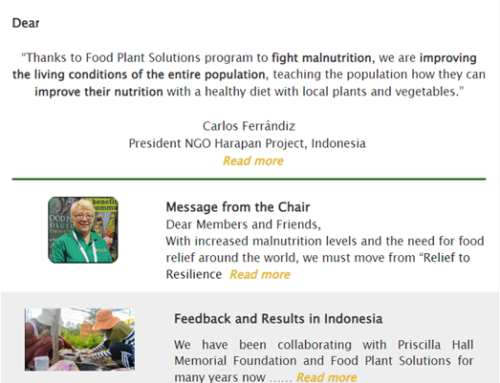Our October edition has articles on stunting, a project to alleviate malnutrition in Papua New Guinea and a profile on one of our program partners – Two Llamas Environmental & Social Projects
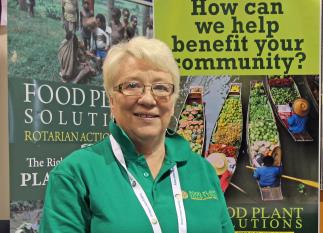
Message from the Chair
I always look forward to speaking to you each quarter to tell you of our successes. We, in Tasmania have just finished hosting the Rotary Australia and New Zealand Conference 2018, where 590 Rotarians came together to celebrate Rotary and learn from each other. We provided a showcase for 25 Rotary programs, one being Food Plant Solutions RAG. It was a thrill to meet so many Rotarians from Australia and New Zealand, who visited the Food Plant Solutions RAG booth. One of the questions I was asked was “can you give me a quick précis of what you stand for and what you do and how we, my club, or my district can help.” So I thought I would share it with you.
Food Plant Solutions is the only Rotary Action Group outside the US. We are a resource for all Rotary Clubs around the world. We provide educational publications that help people understand the connection between plant selection and nutrition, and through education, empower them to grow a range of highly nutritious plants with different seasonal requirements and maturities.
All of our work is underpinned by the Food Plant International database, developed by Bruce French OAM, with over 29,835 edible plants, from all countries of the world.
What do we need to do our work? We need $500 from every club every year to make a difference to the malnutrition levels in the world. We have already had much success, but we need more assistance to develop as many publications as possible ready for the requests that come in to our office. We have some waiting for our help already.
This simple solution can reduce the loss of life and improve mental and physical development. Around the world, especially in poor rural and urban areas, malnutrition is a serious problem for babies, infants and their nursing mothers. Every minute 5 children under 5 die from malnutrition. You CAN make a difference.
Yours in Rotary Service.
PDG Una Hobday, Chair, Food Plant Solutions
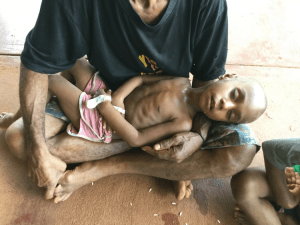
Alleviation of Malnutrition in PNG
Dr Russ Stephenson – Project Leader
Global Grant GG1871361 received approval from the Rotary Foundation (TRF) on 9 August, funding has been received and the project is ready to proceed. The only feedback from TRF reviewers was that, since the project was so comprehensive, its scope be expanded as an Adopt-A-Village project that addresses the following Rotary Areas of Focus:
- Economic and Community Development
- Basic Education and Literacy
- Maternal and Child Health
- Disease Prevention and Treatment
- Water and Sanitation
This is appropriate because all of these important areas impact on malnutrition.
Education and awareness are essential so people are aware that a problem exists in the first place before they can effectively set about solving it. Malnutrition is invariably correlated with a lack of economic development. Even a nutritious, balanced diet does not guarantee freedom from malnutrition. Sickness can induce malnutrition. For example, the malaria parasite feeds on blood, resulting in iron deficiency. Hence, it is essential to help the body to protect itself by maintaining good health. This, in turn, depends on a safe, clean drinking water, high standards of personal hygiene and good sanitation. Our Adopt A Village project will be more effective in alleviating malnutrition because it addresses all these important factors contributing to malnutrition.
The first phase of the project will be a Train-The-Trainer workshop covering all five areas of focus. It will be held at Mougulu Mission in late October/early November for local women leaders. They, in turn, will return to their own and surrounding villages to run their own workshops to create awareness and encouraging changes in diet, hygiene, cleanliness, sanitation, and health (particularly immunisation of their babies) to alleviate malnutrition. You can follow the project over the next three years on Facebook at https://www.facebook.com/mougulunutrition
D9830 SUPPORTS FPS
Earlier this year District 9830 provided Food Plant Solutions with $10,000 from District Designated Funds to create 4 picture guides (the complete set) for Uganda. These were and then sent electronically to our program partner in Uganda – Educate A Child International, who advised “I would like to commend you for the wonderful job well done. The picture guide is awesome and vital.”
The publications can be viewed at – https://foodplantsolutions.org/programs/uganda/ For further details please contact info@foodplantsolutions.org
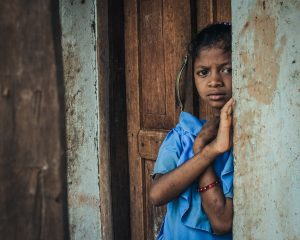
STUNTING – IT CAN BE PREVENTED
Stunting – or low height for age, is a common affliction, with 165 million children under five years old – (one in every four) affected. The first 1000 days from conception are critical in a child’s development. If they do not receive adequate nutrients during this time, they can suffer irreversible damage – both physically and mentally.
Stunting traps people into a lifelong cycle of poor nutrition, illness, poverty and inequity. A child’s poorer school performance results in future income reductions of up to 22 per cent on average. As adults, they are also at increased risk of obesity, diabetes and cardiovascular disease.
The effects of stunting can be passed from one generation to the next. Girls who are born malnourished and become stunted as children, will often become malnourished mothers and the cycle then repeats itself.
By applying Food Plant Solutions principles stunting can be prevented. Then those children who are not afflicted by stunting will have the ability to make informed choices. From that we have real, lasting change. It can be achieved but we need your help. info@foodplantsolutions.org
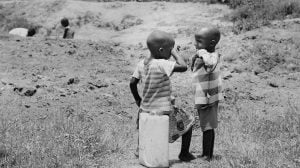
WORLD HUNGER IS ON THE INCREASE
Bruce French – Officer of the Order of Australia
A global report recently produced by the Food Security Network Secretary of the World Food Programme highlights the world food crises into 2018. They reported an 11% rise in world food crises from the previous year.
Another report produced by FAO, IFAD, UNICEF, WHO and WFP describing “The State of Food Security and Nutrition in the World” similarly highlights the tragic state of our world. They state that 151 million children under five are stunted and one out of every nine people in the world are undernourished. World hunger is on the increase.
What is needed is not more reports (as important as they are) but action to improve the situation. For many years FAO have estimated that there are 30,000 edible plant species that are adapted to every location in the world and are often nutrient rich. Thankfully our Food Plants International database has just passed the 30,000 number of records.
The question we need to ask is, “Can the situation be improved?” Many groups are getting excited about the amazing potential of all the under-utilised edible plants of the world. Not only can they be produced sustainably, but often at low cost and provide attractive and healthy diets that are far more than simply counting ‘nutrients’ or food composition. Many of these plants have ancillary benefits these days called “functional foods” because of these other functions. People, especially women, need to be empowered with attractively presented and appropriate information. Computers, mobile phones and the internet make this more easily achievable.
ROTARY CLUB OF DEVONPORT NORTH IN TIMOR-LESTE
Esley Dunham – Food Plant Solutions Committee Member
Six members of the Rotary Club of Devonport North, together with six locals, recently constructed a shed, in the village of Maliana on the western side of Timor-Leste. Sister Elsa is in charge of a small convent of the Cannossian Sisters. Sister Elsa is a child magnet and as each school in Timor- Leste has morning and afternoon attendances, many of these children were coming to the convent seeking her care, some of whom were orphans. The convent only recently established, is a small house and when it rained there was nowhere for the children to go, except under a small verandah; the need for other shelter was obvious.
The team from Devonport North, comprised Rotarians Leigh Titmus, Leigh Murphy, James Roberts-Thomson, John Phillips and Esley Dunham. Between them and the locals they had the building up in four days, two days ahead of schedule. Afterwards there was a lovely opening ceremony including the children and their parents and then a celebration dinner.
Long time Food Plant Solutions committee member, John Phillips, deliberately booked extra time in Timor-Leste so that he could spend extra time in Dili, making contact with prospective partners. Rotary contact, Mario De Jesus, generously guided John during that time.
Why Food Plant Solutions is Unique
We approach aid quite differently to most aid organisations:
We’d like to cease to exist because we were no longer needed. Sadly, we are a long way from that.
We are very low cost. All general donations go solely towards the project.
We never send people in-country but instead form partnerships with existing aid providers who use our publications to educate communities, and particularly women and children, on the nutrient value of their local food plants. Most projects (whether they be housing, water, schools, maternal health, etc.), would be further enhanced by adding a Food Plant Solutions component to them. People who are in dire situations require a sustainable way to grow and access nutritious food.
Our approach is proven to work. We have seen program partners reduce malnutrition in children by as much as 95%.
We need your help to raise funds so that we can continue this work. We ask that you please share this email with your vast network of connections.
And, if you can, please donate now



